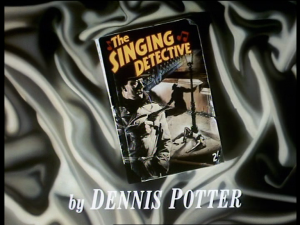by DAVID ROLINSON
“in keeping with the modernist sensibility and self-reflexivity of Hide and Seek and Only Make Believe, the decision to root a view of the past in the experiences and imagination of a writer protagonist, emphasises the fact that, far from being an objective assessment, any perspective on history can only ever be subjective” – John R. Cook.1

This one-day symposium, staged by Royal Holloway University of London on 10 December 2011, celebrated the 25th anniversary of The Singing Detective (1986).2 It paid tribute to the serial’s “narrative complexity, generic hybridity and formal experimentation” and placed writer Dennis Potter’s contribution alongside the contributions made by his collaborators, several of whom were present: producer Kenith Trodd, choreographer Quinny Sacks and actors Patrick Malahide and Bill Paterson.3 Other guests included Peter Bowker (as a modern television writer inspired by Potter), plus academic speakers and, mixing practitioner and academic perspectives, Professor Jonathan Powell, who was Head of Drama at the BBC when The Singing Detective was made. This mixture of academic and practitioner perspectives has been a welcome and often rewarding feature of British television drama conferences in recent years: see, for instance, the conference proceedings published as part of British Television Drama: Past, Present and Future.4
John R. Cook, Dennis Potter: A Life on Screen (Manchester: Manchester University Press, 1998), p. 217. Second edition. Play for Today: Only Make Believe, tx. BBC1, 12 February 1973. ↩
The Singing Detective, tx. BBC1, 16 November 1986-21 December 1986. ↩
Quotation from the conference blurb, which is still available, with the day’s running order, at http://ies.sas.ac.uk/events/conferences/2011/SingingDetective/ ↩
Jonathan Bignell, Madeleine Macmurraugh-Kavanagh and Stephen Lacey (editors), British Television Drama: Past, Present and Future (Basingstoke: Palgrave, 2000). ↩
